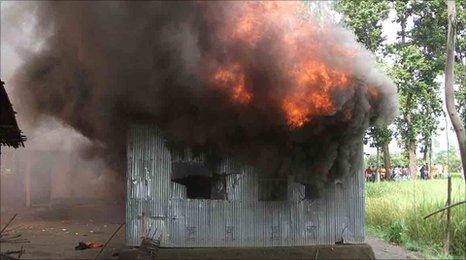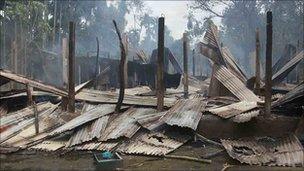Arrests in Bangladesh after village arson attack
- Published

It is the first major attack on the enclave in many years
Police in Bangladesh say they have arrested 11 people over an arson attack on a village in an Indian enclave inside Bangladeshi territory.
More than 200 houses inside the enclave were burnt down.
Residents reportedly refused to return the body of a Bangladeshi villager allegedly killed by the Indians.
The Indian enclave, Garati, is situated inside Bangladesh, about 3.5km (two miles) from the border which is not properly demarcated.
About 2,000 people live in the enclave, which is surrounded by the Bangladeshi district of Panchagarh.
Tense relations
Indians allege that the intruder from Bangladesh was a robber but villagers from the neighbouring area deny the accusations.

Many inhabitants of the enclave have been left homeless
Reports say only half the population of the enclave has returned to the area so far.
Hundreds of people have spent the last few nights out in the open as their homes were destroyed in the violence.
Residents of the enclave say they had lost household goods and valuables in the mob attack.
"Normalcy is slowly returning to the area. We have deployed additional forces to prevent further violence," Shahriar Rahman, a senior police official in the district of Panchagarh, told the BBC Bengali service.
There has been no comment yet from the Indian side on the incident.
Local journalists say this is the first major attack on an Indian enclave in many years. The incident has once again highlighted the tense relations in the border areas.
India and Bangladesh have enclaves in each other's territory and the two sides have been holding talks for years to resolve all border-related issues.
The two countries share a border of more than 4,100km (2,550 miles).
There are more than 100 Indian enclaves inside Bangladeshi territory and there are about 50 Bangladeshi enclaves in India - thousands of people live in them.
Residents of these enclaves often complain that there is virtually no infrastructure and no government. They say there is a lack of water, roads, electricity, schools and medicine.
Activists say neither government is seriously interested in addressing the plight of people living in the enclaves.